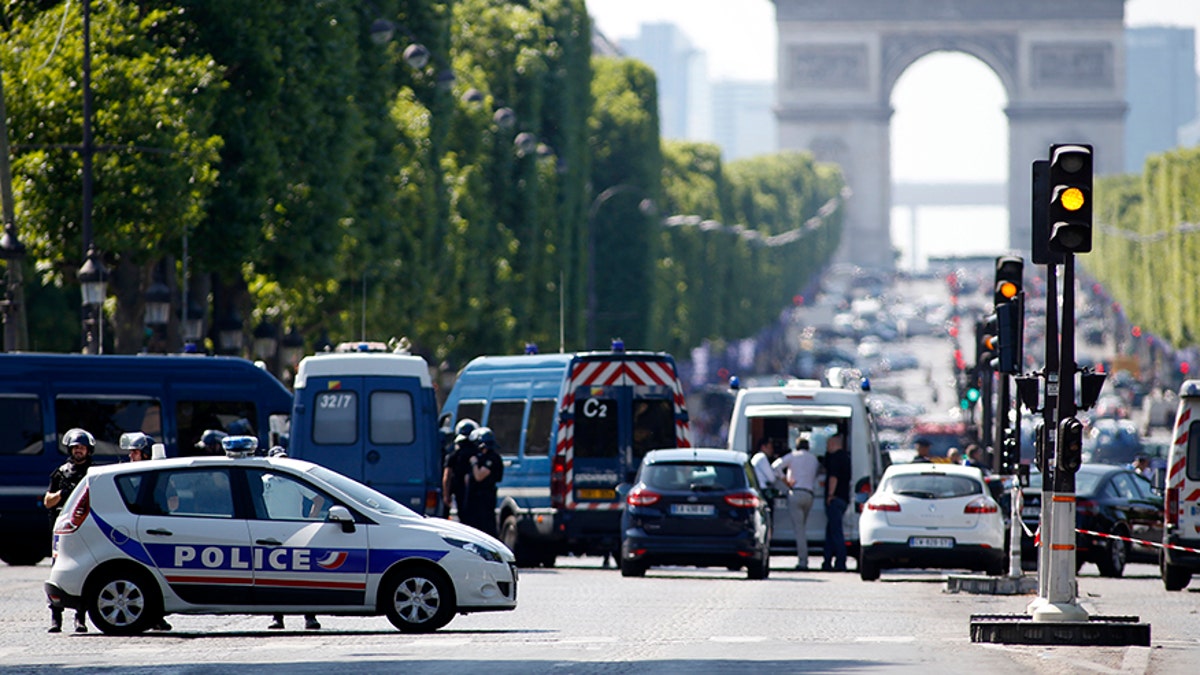
June 19, 2017: Police forces secure the area on the Champs Elysées in Paris. (AP)
BRUSSELS – Two botched attacks in Europe in recent days signal that Islamist terror has reached a new phase, security officials say, one that is more disorganized and less sophisticated but risks spawning more assailants eager to kill with any means at hand.
When an Islamic State sympathizer tried to set off a bomb Tuesday night at a train station here, it failed to detonate with the intended force. Investigators suspect he used a faulty explosives recipe found online. The intended victims were able to flee, and the attacker was shot dead.
On June 19, another would-be terrorist drove a sedan packed with guns, thousands of rounds of ammunition and two canisters of propane gas onto the Champs-Elysees in the heart of Paris. He rammed the lead vehicle of a police convoy, apparently intent on an attack. Instead, police said he died when he was overcome by fumes after the collision, and no one else was killed or injured.
The lack of direct training and know-how of many of this new breed of attacker means many fail. But their lack of connection to terror networks makes them hard to track, and their often unsophisticated weapons -- such as knives or cars -- are easy to get. So authorities fear the attacks will grow.
"We may be entering an era not of lone wolf, but stray dog attacks," said one Western security official.
The man who fumbled the attack in Belgium, Oussama Zariouh, attempted to prepare the hydrogen-peroxide-based explosive TATP in his Brussels apartment, the official said. He managed to make a flammable substance, but one lacking serious explosive power, and the initial detonation only started a fire. The explosion then went off, but without the intended force.
"The guy was able to build a bomb, but the bomb failed," said Claude Monique, a former French intelligence official who leads the Brussels-based European Strategic Intelligence and Security Center, a think tank. "Most of these attacks fail because these guys are not trained."
Such terrorism marks a shift from the kind of large-scale attacks carried out by extremist cells that have hit the Continent in the past, including Islamic State militants' gun-and-bomb attacks in Paris in November 2015 and March 2016 attacks on Brussels airport and subway.
Authorities across Europe say they have seen an uptick in terror activity -- often of the small-scale, less --organized kind -- since a May 2016 call by Islamic State for its supporters to kill non-Muslims in the West.
The changing nature of the attacks also reflects improved security in Europe, where the European Union and national governments have stepped up surveillance, tightened borders and deployed more police and soldiers. Military campaigns against Islamic State in the Mideast have also made it more difficult for terror leaders to organize and carry out attacks.
But officials warn it would be reckless to underestimate the continuing threat of extremist groups even if they may be conducting operations that are more frequently smaller-scale. "It is too easy to say they are too degraded, they are not capable anymore," said a European official. "That would be a mistake."
